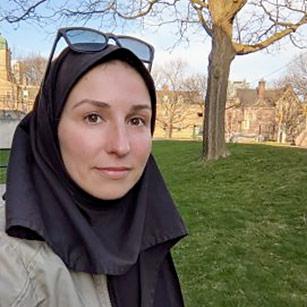
77 Massachusetts Ave.
Cambridge, MA 02139
Degrees
- PhD, Computer Science, MIT, 2017
- MS, Biomedical Engineering, Oxford University, 2011
Bio
Before joining MIT, Marzyeh was an Assistant Professor at the University of Toronto in Computer Science and Medicine, and a Vector Institute faculty member holding a Canadian CIFAR AI Chair and Canada Research Chair. She joined MIT’s IMES/EECS in July 2021.
Marzyeh currently serves as a NeurIPS 2019 Workshop Co-Chair, and General Chair for the ACM Conference on Health, Inference and Learning (CHIL). Previously, she was a Visiting Researcher with Alphabet’s Verily and a post-doc with Peter Szolovits at MIT. Prior to her PhD in Computer Science at MIT, she received an MSc. degree in biomedical engineering from Oxford University as a Marshall Scholar, and B.S. degrees in computer science and electrical engineering as a Goldwater Scholar at New Mexico State University.
Marzyeh has a well-established academic track record across computer science and clinical venues, including NeurIPS, KDD, AAAI, MLHC, JAMIA, JMIR, JMLR, AMIA-CRI, EMBC, Nature Medicine, Nature Translational Psychiatry, and Critical Care. Her work has been featured in popular press such as MIT News, NVIDIA, Huffington Post. She was also recently named one of MIT Tech Review’s 35 Innovators Under 35.
Marzyeh is on the Senior Advisory Council of Women in Machine Learning (WiML), and organized its flagship workshop at NIPS during December 2014. She has also organized and MIT’s first Hacking Discrimination event, and was awarded MIT’s 2018 Seth J. Teller Award for Excellence, Inclusion and Diversity.
She served on MIT’s Presidential Committee on Foreign Scholarships from 2015–2018, working with MIT students to create competitive applications for distinguished international scholarships. In 2015, she also worked as a graduate student member of MIT’s CJAC (Corporation Joint Advisory Committee on Institute-wide Affairs), a committee to which the Corporation can turn for consideration and advice on special Institute-wide issues.
From 2013–2014, she was a student representative on MIT’s Women’s Advisory Group Presidential Committee, and additionally was elected as a Graduate Student Council (GSC) Housing Community Activities Co-Chair. As co-chair, she worked with subcommittee leads to create a third month of maternity benefits for EECS graduate women, create a $1M+ fundraising target for a needs-based grant administered to graduate families at MIT, successfully negotiated a 4% stipend increase for MIT graduate students for the 2014 fiscal year (approved by MIT’s Academic Council), and worked with HCA’s Transportation Subcommittee to expand new transportation options for the 2/3 of graduate students that live off campus. During 2012–2013, she was one of MIT’s GSC Housing Community Activities Family Subcommittee Leads, and campaigned to have back-up childcare options extended to all graduate students at MIT. This led the GSC to commit $30,000 to a pilot for the program, which was matched by the administration. The program is now fully funded by MIT, and considered a success.
Research Interests
Representation Learning, Behavioral ML, Healthcare ML, Healthy ML
Selected Awards and Societies
- Sept 2021 Herman L. F. von Helmholtz Career Development Professorship, MIT
- July 2020 Azrieli Global Scholar, CIFAR’s Program in Learning in Machines and Brains
- Oct. 2018 “35 Innovators Under 35” Award, MIT Technology Review
Selected Publications
COVID-19 Image Data Collection: Prospective Predictions Are the Future 660 2020
JP Cohen, P Morrison, L Dao, K Roth, TQ Duong, M Ghassemi
arXiv preprint arXiv:2006.11988
Unfolding Physiological State: Mortality Modelling in Intensive Care Units 225 2014
M Ghassemi, T Naumann, F Doshi-Velez, N Brimmer, R Joshi, …
KDD 2014
A multivariate timeseries modeling approach to severity of illness assessment and forecasting in icu with sparse, heterogeneous clinical data 192 2015
M Ghassemi, MAF Pimentel, T Naumann, T Brennan, DA Clifton, …
Twenty-Ninth AAAI Conference on Artificial Intelligence
Do no harm: a roadmap for responsible machine learning for health care 164 2019
J Wiens, S Saria, M Sendak, M Ghassemi, VX Liu, F Doshi-Velez, K Jung, …
Nature medicine 25 (9), 1337-1340
Continuous state-space models for optimal sepsis treatment: a deep reinforcement learning approach 104 2017
A Raghu, M Komorowski, LA Celi, P Szolovits, M Ghassemi
Machine Learning for Healthcare Conference, 147-163
State of the art review: the data revolution in critical care 99 2015
M Ghassemi, LA Celi, DJ Stone
Critical Care 19 (1), 1-9
State of the Art Review: The Data Revolution in Critical Care 99 2015
M Ghassemi, LA Celi, JD Stone
Annual Update in Intensive Care and Emergency Medicine 2015, 573-586
Predicting early psychiatric readmission with natural language processing of narrative discharge summaries 95 2016
A Rumshisky, M Ghassemi, T Naumann, P Szolovits, VM Castro, …
Translational psychiatry 6 (10), e921-e921
Can AI Help Reduce Disparities in General Medical and Mental Health Care? 90 2019
IY Chen, P Szolovits, M Ghassemi
AMA Journal of Ethics 21 (2), 167-179
Using ambulatory voice monitoring to investigate common voice disorders: Research update
DD Mehta, JH Van Stan, M Zañartu, M Ghassemi, JV Guttag, …
Frontiers in bioengineering and biotechnology 3, 155
A full list of Professor Ghassemi’s publications can be found here.
Courses Taught
- MIT HST.953: Clinical Data Learning, Fall 2021, Fall 2022
- MIT EECS 6.882: Ethical Machine Learning in Human Deployments, Spring 2022
Description
The Healthy ML group at MIT, led by Dr. Marzyeh Ghassemi, focuses on creating and applying machine learning to understand and improve health in ways that are robust, private and fair. We work on robust machine learning models that can efficiently and accurately model events from healthcare data, and investigate best practices for multi-source integration, and learning domain appropriate representations.
